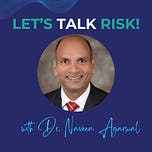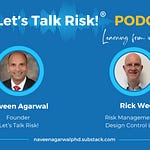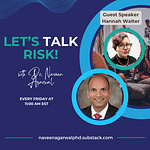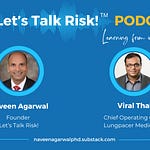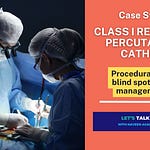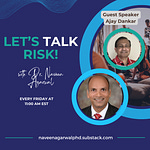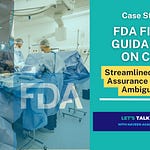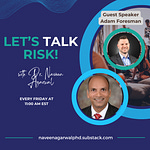“The eyes can only see what the mind understands.”
The world of medical devices is complex. There are many regulations, standards and guidance documents to read and understand, and apply them correctly during design, development and clinical investigations for regulatory success.
In this Let’s Talk Risk! conversation, Dr. Emanuel Tkach encourages us to keep the big picture in mind. Engineers and Clinicians, who are not generally trained in regulatory affairs, also need to develop a good understanding of these requirements. As an example, we must clearly understand the intended use and indication for our device. It is in the context of the intended use that we have to plan and conduct our clinical investigations to generate evidence of safety and effectiveness.
AI-enabled devices, including those used for detection and diagnosis, presents unique issues. Data privacy and security, including cybersecurity vulnerabilities need to be addressed. Risk of using open source data should carefully considered during development, testing and final use. Unless absolutely necessary, it is best not to use open source data.
Another potential area of concern is physician over-reliance on AI/ML devices. Dr. Tkach reminds us to keep the following in mind:
At the end of the day, an AI-enabled device is a tool to be used by the clinician and not as a substitute for clinical judgment.
Listen to this Let’s Talk Risk! conversation with Dr. Emanuel Tkach, which also includes an open discussion with the audience. Jump to a section of interest using these timestamps.
00:02:05 Introduction
00:04:13 CADe and CADx: two types of computer aided detection and diagnosis
00:05:23 Addressing physician over-reliance on technology in clinical trials
00:07:14 Relevant ISO standards for AI, clinical investigations and quality
00:10:14 Clinical perspective on designing AI-enabled devices and managing risk
00:15:38 How non-regulatory professionals should approach regulations and standards
00:17:20 Audience Q&A
00:32:30 Closing comments and key takeaways
If you enjoyed this podcast, consider subscribing to the Let’s Talk Risk! newsletter.
About Emanuel Tkach, MD
Dr. Emanuel Tkach is currently the Medical Advisor at HeartPoint Global, where he leads the global clinical strategy and operations of clinical trials. He also provides advice on breakthrough device designation submissions, recruiting and strategizing with key opinion leaders (KOL) to accelerate medical device innovation. His medical specialty and clinical experience includes Gastroenterology, Cardiology and Primary Care. He holds a BS degree in Biology/Biological Sciences and an MD in Medicine.
About Let’s Talk Risk! with Dr. Naveen Agarwal
Let’s Talk Risk! with Dr. Naveen Agarwal is a weekly live audio event on LinkedIn, where we talk about risk management related topics in a casual, informal way. Join us at 11:00 am EST every Friday on LinkedIn.
Disclaimer
Information and insights presented in this podcast are for educational purposes only. Views expressed by all speakers are their own and do not reflect those of their respective organizations.


